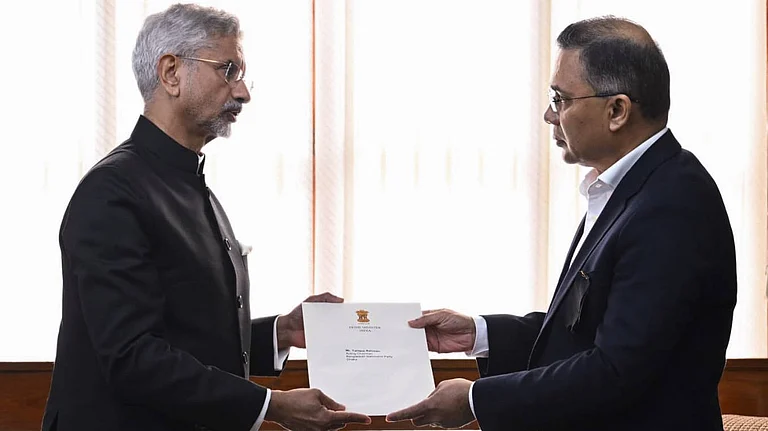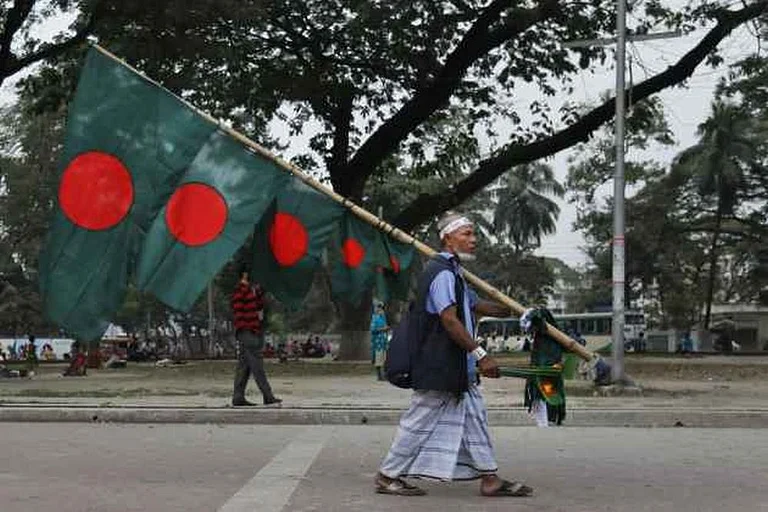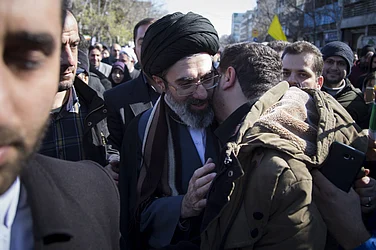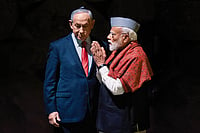
Summary of this article
Hasina, the 78-year-old daughter of Mujibur Rahman, the founder of Bangladesh, was convicted in absentia of crimes against humanity by the ICT.
Ironically, the ICT was set up by Hasina to try those who had collaborated with Pakistan during the 1971 war of independence.
Following the judgement, Bangladesh has once again asked India to hand over Hasina, saying that the extradition treaty of 2013 makes it obligatory for India to do so.
The stakes were already stacked against former Bangladesh Prime Minister Sheikh Hasina. The outcome was a given. On November 17, crowds gathered in the early hours outside the Dhaka courthouse in anticipation of the death sentence. Yet, when the International Crimes Tribunal-Bangladesh (ICT) made the announcement, awarding the death sentence, the crowd broke into spontaneous applause. Young people, who led the protests last year, distributed sweets, hugged each other and hailed the verdict as overdue justice for a leader they accuse of ordering a massacre of her own citizens.
Hasina, the 78-year-old daughter of Mujibur Rahman, the founder of Bangladesh, was convicted in absentia of crimes against humanity. Her home minister Asaduzzaman Khan was awarded the death sentence along with her. Inside the court, lawyers and families of victims clapped and hooted in appreciation as they heard the dire pronouncement.
Ironically, the ICT was set up by Hasina to try those who had collaborated with Pakistan during the 1971 war of independence. She was bitterly criticised for bringing in what the then opposition dubbed as a kangaroo court. The same terms are now being used by the Awami League supporters to describe the ICT.
Hasina’s response to the verdict was defiant, calling it “biased and politically motivated” and rigged “by an unelected government with no democratic mandate”.
Following the judgement, Bangladesh has once again asked India to hand over Hasina, saying that the extradition treaty of 2013 makes it obligatory for India to do so. New Delhi is unlikely to oblige.
“Geopolitically, there is no way that India will ever agree to extradite Hasina. The current dispensation in Bangladesh is infested with anti-Indian Jamaat activists who are Pakistani supporters and who worked against the liberation of Bangladesh in 1971. India can never succumb to their demands,” says retired diplomat Ashok Sajjanhar.
Sajjanhar says: “Legally, there are several caveats and exceptions available to India to deny the extradition request. Procedurally, the issue of extradition is highly complex, intricate and time-consuming. Sheaves of documentation need to be provided to the courts of the country from where extradition is sought to enable the authorities to take a considered decision.” This could drag on for years.
“The death sentence does not augur well for Bangladesh,” says Pinak Ranjan Chakravarty, former Indian envoy to Dhaka. This will further fracture the existing fault lines. The mood in Bangladesh is anti-India as people view New Delhi as Hasina’s enabler, which gave its stamp of legitimacy to the elections of 2014, 2018 and 2024, which people believe were rigged.
Bangladesh is a deeply polarised nation. Since its founding, the country’s politics has revolved around the divide between those who fought for freedom from Pakistan and those—like the Jamaat-e-Islami—which opposed independence. The assassination of Hasina’s father, Mujibur Rahman, along with 14 members of his family in 1975, stemmed from longstanding hostility toward the man who created Bangladesh.
The wounds never healed. There was no reconciliation. When Hasina came to power, she sent Jamaat leaders to the gallows to bring closure to families who demanded justice. These divisions persisted throughout Hasina’s long tenure—from 2009 to 2024. She banned the Jamaat, put thousands of political opponents in prison, and cracked down on dissent. Her government was focused on providing special benefits to families linked to the country’s freedom movement. The last straw was when Hasina sought to bring in a quota in government jobs for them. That decision brought simmering anger into the open, with students defying government crackdowns. The rest, as we know, is history.
Yet, her governance was not without achievements. Hasina did a good job on the economy. The World Bank gave her government a glowing reference in its 2023 report, as one of the world’s fastest-growing economies. It transformed itself from one of the poorest countries to becoming a lower-middle income country by 2015. Yet despite the prosperity, corruption and authoritarianism remained.
For India, which shares a 4,000 km border with Bangladesh, adjoining its sensitive northeastern region, Hasina’s ouster poses a strategic challenge. The changing geopolitics has led to a realignment of forces, with Pakistan back in the reckoning in Bangladesh. The Awami League had kept Islamabad at bay, considering their history. But the new political establishment that has emerged in Bangladesh has been quick to repair ties with Pakistan.
“There has been a spate of visits by Pakistan’s military and intelligence officials since the interim government, headed by Nobel Laureate Muhammad Yunus, has taken over,” says Smruti S. Pattanaik of the Delhi-based think-tank, the Manohar Parrikar Institute for Defence Studies and Analyses (MP-IDSA). “There is a rise of radicalism in Bangladesh, thus the fear of an Islamic terror network targeting India has become very real,” she adds.
It is true that after Hasina’s exit, Islamic political groups have emerged from the woodwork with renewed vigour and gained traction. Many of these groups are preparing to contest elections and enter parliament next year. Apart from the Jamaat-e-Islami, more radical outfits like the Hefazat-e-Islam Bangladesh (HIB)—made up of Qawmi madrasa teachers and students—have sprouted. The HIB held a massive rally in Dhaka on May 3, demonstrating their expanding influence and ability to mobilise. Groups like the Al-Qaeda in the Indian subcontinent and the Islamic State of Khorasan Province are also present in the country.
India has no choice but to deal with whichever government is in power. The response of the Union Ministry of External Affairs to the death sentence was muted. India is waiting till after the elections to begin a serious engagement with Dhaka. Relations with the current dispensation led by Yunus are frosty. In a first, Khalilur Rahman, the country’s National Security Advisor (NSA), arrived in Delhi to attend the Colombo Security Conclave hosted by India’s NSA Ajit Doval.
National elections in Bangladesh are scheduled to be held in February next year. At the moment, Khaleda Zia’s Bangladesh Nationalist Party (BNP) appears to be the best organised party to win. The Jamaat-e-Islami is likely to also get substantial numbers. Hasina had banned the Jamaat from contesting elections. The Awami League is now facing the same problem, with suspension of its registration by the Election Commission. The government had earlier banned all activities of the Awami League under the anti-terrorism act following the protests.
There is no clarity on the future of the Awami League. Mahfuj Alam, a former protest coordinator who is now adviser for Information and Broadcasting, was reported by The Daily Star as saying: “The Awami League will no longer be allowed to establish itself politically in Bangladesh.” Students want to make sure that the party remains banned. However, many believe that the Awami League could resurrect itself in a few years in a different avatar.
“I doubt that the Awami League will be able to contest next year’s elections. But later, perhaps, the party, which still has the support of 20-25 per cent of the population, cannot really be left out. The Awami League can survive minus Hasina or any member of the family,” says a Dhaka-based analyst who did not wish to be named.
The other party in the fray is the newly formed National Citizen Party (NCP), founded by the leaders of the student movement. The NCP is popular, but does not have the organising capacity of the BNP.
The February election will give a new government the chance to repair the country’s fractured politics. Bangladesh has lived too long with the ghosts of 1971, and the death sentence to Hasina threatens to summon them again. Whether the country can pull back from the cycle of vengeance or is set to enter a new era of prolonged instability will depend on Bangladesh’s political class.
MORE FROM THIS ISSUE
Seema Guha is a senior journalist covering foreign affairs.







.jpg?auto=format%2Ccompress&fit=max&format=webp&w=768&dpr=1.0)




















